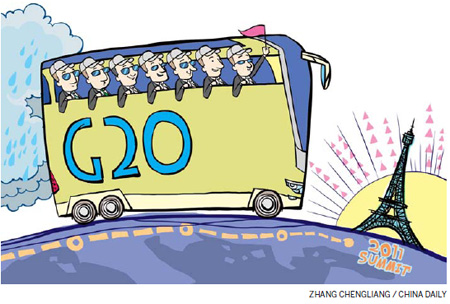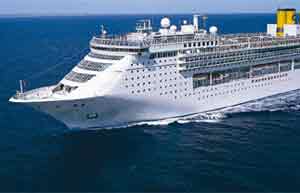G20's grand role on the world stage
Updated: 2011-11-04 08:55
By Wang Li (China Daily)
|
|||||||||

The Group of Seven, which has been superseded by the Group of 20, is still active but in decline. People have been paying their last respects to this former prominent global economic governance platform since the first G20 summit in Washington in 2008. But these seven members, seemingly reluctant to take their leave, now coordinate their stance before each G20 meeting, and sometimes cannot resist jumping on issues such as currency and monetary policy, which deserve broader discussion.
As proven by its quick, and to some extent futile, response in the last few months when the European debt crisis worsened, the G7 may have a role to play in the period between G20 meetings but these days cannot solve even its own problems.
Ultimately it has been the G20 that has been pivotal in laying the ground for solving the European debt crisis. It was under the pressure from G20 financial ministers that European countries finally agreed on a "comprehensive solution". But they didn't unveil their detailed plan, because the financial resources immense enough to bail themselves out of the mess were not due to be accessed until the Cannes summit this week. EU leaders devised a "special purpose investment vehicle" to borrow financial stabilizing firepower from other G20 countries.
In other words, the G20 has been reaffirmed as the last resort for global economic risk management and the highest table for international cooperation.
The G20 was designated the prominent platform of global economic governance for underlying reasons.
The origin of the group can be traced back to the very end of last century, when the world began to realize, after waves of regional financial turmoil, that developing countries should be engaged in the international financial agenda. Although the real significance of the G20 was gained through leaders' meeting in the face of the international crisis and economic recession in 2008, it was never meant to be a mere anti-crisis mechanism. It is also regarded as a landmark for the transition of the international system and has institutionalized itself following a well thought-out path.
It reflects the historical change of world economic reality. Over the past 11 years emerging economies have grown fabulously, accelerating the multi-polar trend. Emerging markets and developing economies now account for an equal share of world GDP, in purchase price parity terms, with advanced economies.
For the foreseeable future this switch of power will continue. The OECD estimates that the financial crisis will permanently slash two percentage points off the growth rate of developed economies. And it was forecasted that BRICS countries (Brazil, Russia, India, China and South Africa) will be installed among the top 10 economies, G20 countries being the new center of gravity of the world economy.
Global imbalance has been a recurring phenomenon in post-war economic history, accompanying tides of globalization. There have been two peaks of major imbalance, in the 1960s and in the 1980s, all of which existed between Western countries, with Europe and Japan holding current account surpluses whereas the US carried deficits. At that time the G7 was adopted as the right framework in which to deal with the results, and to correct the imbalance.
However, a third episode of global imbalance looms, and well beyond the boundaries of the G7, because of the role of emerging markets in globalization. The G20 set up the new framework for strong, sustainable and balanced growth after its leaders defined the group's global leading role in Pittsburgh in 2009.
Its authority is buttressed by three highly professional and powerful organizations, the International Monetary Fund, the World Bank and the World Trade Organization. The first two have their genesis in the Bretton Woods system, and the WTO system is the most binding arrangement ever made responsible for trade disputes. All three used to be central to the international system and supervised the world economy for the West. Now they all function under the G20, providing macro-analysis for summit meetings, carrying out concrete action under the instructions of its leaders, and coordinating with officials from member countries.
Even the United Nations is chipping in, something the UN Secretary-General Ban Ki-moon did this week before the Cannes summit.
Critics, usually from the West, say that since the Pittsburgh gathering in 2009, the summits have failed to give the expected final word on the international agenda.
Some critics say the size of the group makes effective coordination difficult, while others laud that very aspect of the G20, its size, as it represents almost 90 percent of world output. The critics decry the intense attention given to each summit and lament the lack of appreciation for low-profile bilateral talks or more specialized ones that, because they are short on pomp and spotlights, make discussion and compromise easier. The hype attendant at these meetings particularly rankles them when they consider the pressure from people in developed countries for signs that some kind of progress is being made.
Unfortunately, recovering from a once-in-a-century recession is not easy. Though many knew this was a crisis of such proportions, few realized how painful it would be to get through and how long it would last. World growth is weighed down with burdens from the balance sheets of developed economies, as shown by the rising fear of a global double-dip recession induced by transatlantic default risks and falling stocks since August.
The sizes of fiscal deficits and sovereign debt in the developed world have soared to a post-war record and will keep accumulating in an unsustainable way. In the near future, developed economies may manage to grow modestly, at best, but unsurprisingly not strongly enough to improve employment instantly.
Besides being charged to promote economic growth, the G20 also has an agenda of reform, including ushering in a new global currency system and remaking financial institutions.
In its actions it needs to be prudent, a characteristic that ought to draw praise rather than criticism, particularly given the difficulty and complexity of the problems on its plate. When it comes to systemic change and marshaling and channeling old and new forces in different ways, what matters most is endurance and perseverance.
While the process of international dialogue and cooperation does not always yield tangible, effective results, the alternative would be far worse, as The Economist has argued. In any case, G20 debates do shape national agendas on various policies relating to things such as trade, exchange rates, and financial regulation.
Within the G20 China is being pushed toward a central role, whether it likes it or not. Before the G20 era China and other major emerging economies, although having interacted with the G7 when required to do so, were never treated as equal. Now China plays an indispensable role in almost every agenda.
When it comes to diversifying the international currency system, the yuan is regarded as having the most potential for the basket of special drawing rights. When it comes to reallocating voting rights within international organizations, China is technically the least represented entity. And when it comes to external help for financial stability in Europe, China is the first to spring to everybody's mind.
The G20 constitutes an ideal arena for China's amazing development from developing economy to middle income power. As was the case with the Asia-Pacific Economic Cooperation forum, the first economic organization in which China participated and which was an institutional bridge for its integration into the regional economy in the 1990s, the G20 could also provide an accommodating environment for China's evolution in the globe from powerhouse to power-in-the-house.
The author is a researcher with the center of world economy under the China Institute of Contemporary International Relations. The opinions expressed in the article do not necessarily reflect those of China Daily.











